Agency Relationship: Legal Duties, Responsibilities, and Case Studies
VerifiedAdded on 2022/08/16
|8
|2708
|172
Report
AI Summary
This report provides a detailed analysis of agency relationships within a legal context, focusing on the duties and responsibilities of both principals and agents. It begins with an introduction to the agency relationship, emphasizing its fiduciary and consensual nature, and highlights key characteristics that distinguish it from other contractual relationships. The report then delves into the various ways an agency relationship can be established, including express and implied agreements, ratification, necessity, and estoppel. The features of agency are explored, such as consent, representation, and the authority of the agent (actual and apparent). The report also covers the termination of agency relationships. A significant portion of the report is dedicated to the duties of agents, both general and fiduciary, including avoiding conflicts of interest, following instructions, maintaining confidentiality, and acting in good faith. The report references important case laws, such as Bristol and West Building Society v Mothew, Bamgboye v. University Of Ilorin, Industries & General Mortgage Co Ltd v Lewis, Boston Deep Sea Fishing and Ice Co v Ansell, and Henderson v Merrett Syndicates Ltd to illustrate these concepts, providing a comprehensive overview of the legal framework governing agency relationships.

LEGAL ASPECTS OF BUSINESS
Paraphrase This Document
Need a fresh take? Get an instant paraphrase of this document with our AI Paraphraser
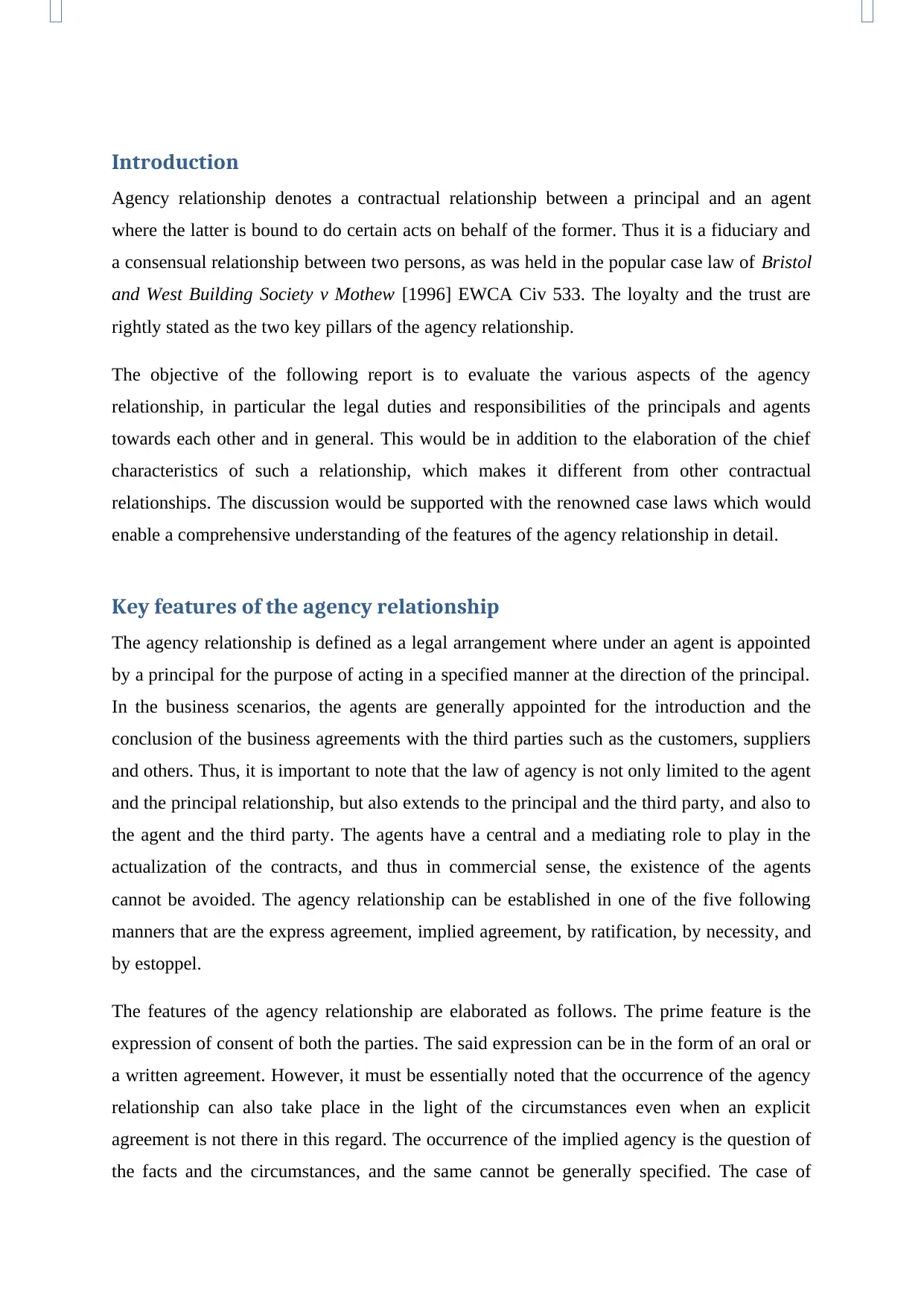
Introduction
Agency relationship denotes a contractual relationship between a principal and an agent
where the latter is bound to do certain acts on behalf of the former. Thus it is a fiduciary and
a consensual relationship between two persons, as was held in the popular case law of Bristol
and West Building Society v Mothew [1996] EWCA Civ 533. The loyalty and the trust are
rightly stated as the two key pillars of the agency relationship.
The objective of the following report is to evaluate the various aspects of the agency
relationship, in particular the legal duties and responsibilities of the principals and agents
towards each other and in general. This would be in addition to the elaboration of the chief
characteristics of such a relationship, which makes it different from other contractual
relationships. The discussion would be supported with the renowned case laws which would
enable a comprehensive understanding of the features of the agency relationship in detail.
Key features of the agency relationship
The agency relationship is defined as a legal arrangement where under an agent is appointed
by a principal for the purpose of acting in a specified manner at the direction of the principal.
In the business scenarios, the agents are generally appointed for the introduction and the
conclusion of the business agreements with the third parties such as the customers, suppliers
and others. Thus, it is important to note that the law of agency is not only limited to the agent
and the principal relationship, but also extends to the principal and the third party, and also to
the agent and the third party. The agents have a central and a mediating role to play in the
actualization of the contracts, and thus in commercial sense, the existence of the agents
cannot be avoided. The agency relationship can be established in one of the five following
manners that are the express agreement, implied agreement, by ratification, by necessity, and
by estoppel.
The features of the agency relationship are elaborated as follows. The prime feature is the
expression of consent of both the parties. The said expression can be in the form of an oral or
a written agreement. However, it must be essentially noted that the occurrence of the agency
relationship can also take place in the light of the circumstances even when an explicit
agreement is not there in this regard. The occurrence of the implied agency is the question of
the facts and the circumstances, and the same cannot be generally specified. The case of
Agency relationship denotes a contractual relationship between a principal and an agent
where the latter is bound to do certain acts on behalf of the former. Thus it is a fiduciary and
a consensual relationship between two persons, as was held in the popular case law of Bristol
and West Building Society v Mothew [1996] EWCA Civ 533. The loyalty and the trust are
rightly stated as the two key pillars of the agency relationship.
The objective of the following report is to evaluate the various aspects of the agency
relationship, in particular the legal duties and responsibilities of the principals and agents
towards each other and in general. This would be in addition to the elaboration of the chief
characteristics of such a relationship, which makes it different from other contractual
relationships. The discussion would be supported with the renowned case laws which would
enable a comprehensive understanding of the features of the agency relationship in detail.
Key features of the agency relationship
The agency relationship is defined as a legal arrangement where under an agent is appointed
by a principal for the purpose of acting in a specified manner at the direction of the principal.
In the business scenarios, the agents are generally appointed for the introduction and the
conclusion of the business agreements with the third parties such as the customers, suppliers
and others. Thus, it is important to note that the law of agency is not only limited to the agent
and the principal relationship, but also extends to the principal and the third party, and also to
the agent and the third party. The agents have a central and a mediating role to play in the
actualization of the contracts, and thus in commercial sense, the existence of the agents
cannot be avoided. The agency relationship can be established in one of the five following
manners that are the express agreement, implied agreement, by ratification, by necessity, and
by estoppel.
The features of the agency relationship are elaborated as follows. The prime feature is the
expression of consent of both the parties. The said expression can be in the form of an oral or
a written agreement. However, it must be essentially noted that the occurrence of the agency
relationship can also take place in the light of the circumstances even when an explicit
agreement is not there in this regard. The occurrence of the implied agency is the question of
the facts and the circumstances, and the same cannot be generally specified. The case of
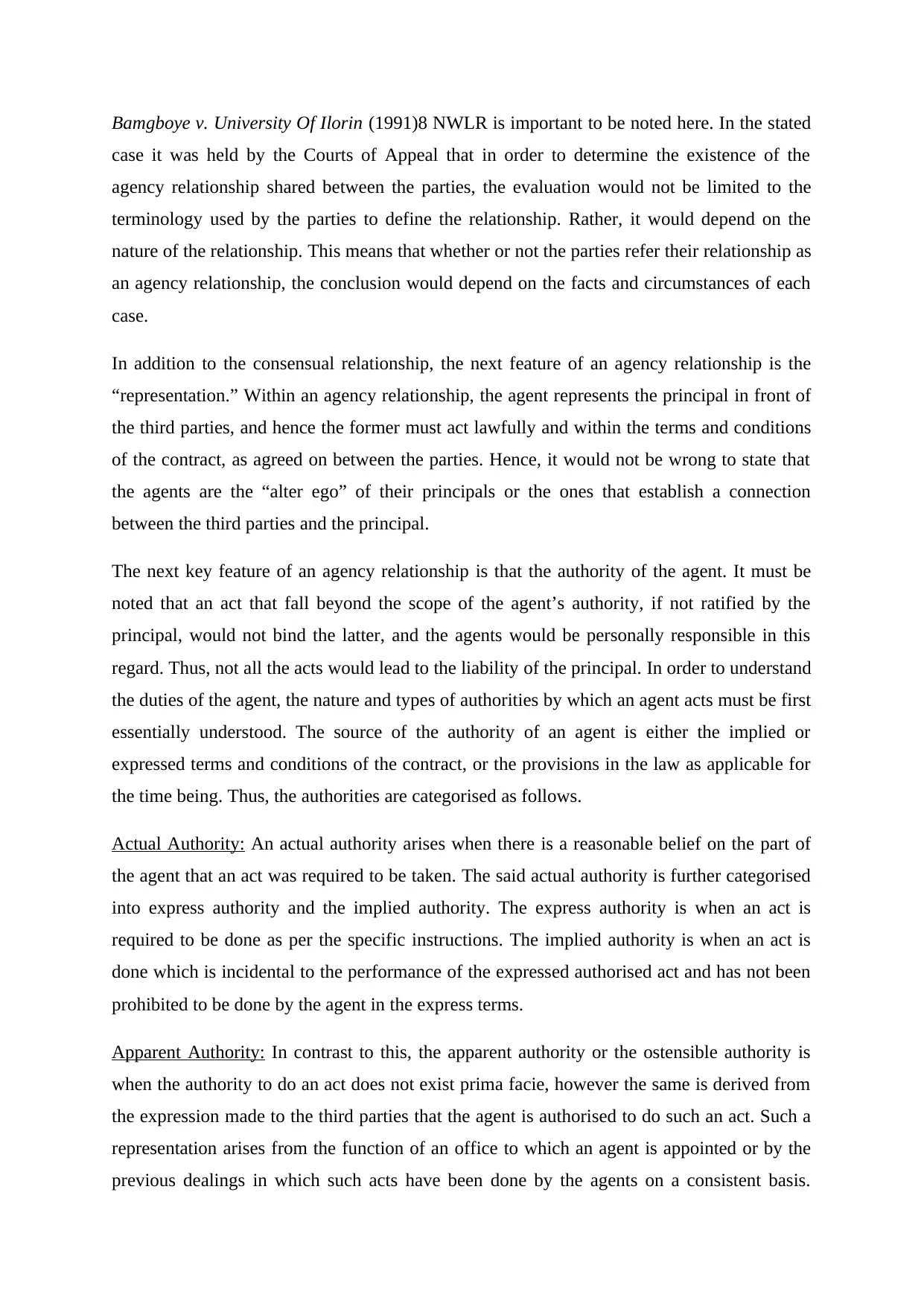
Bamgboye v. University Of Ilorin (1991)8 NWLR is important to be noted here. In the stated
case it was held by the Courts of Appeal that in order to determine the existence of the
agency relationship shared between the parties, the evaluation would not be limited to the
terminology used by the parties to define the relationship. Rather, it would depend on the
nature of the relationship. This means that whether or not the parties refer their relationship as
an agency relationship, the conclusion would depend on the facts and circumstances of each
case.
In addition to the consensual relationship, the next feature of an agency relationship is the
“representation.” Within an agency relationship, the agent represents the principal in front of
the third parties, and hence the former must act lawfully and within the terms and conditions
of the contract, as agreed on between the parties. Hence, it would not be wrong to state that
the agents are the “alter ego” of their principals or the ones that establish a connection
between the third parties and the principal.
The next key feature of an agency relationship is that the authority of the agent. It must be
noted that an act that fall beyond the scope of the agent’s authority, if not ratified by the
principal, would not bind the latter, and the agents would be personally responsible in this
regard. Thus, not all the acts would lead to the liability of the principal. In order to understand
the duties of the agent, the nature and types of authorities by which an agent acts must be first
essentially understood. The source of the authority of an agent is either the implied or
expressed terms and conditions of the contract, or the provisions in the law as applicable for
the time being. Thus, the authorities are categorised as follows.
Actual Authority: An actual authority arises when there is a reasonable belief on the part of
the agent that an act was required to be taken. The said actual authority is further categorised
into express authority and the implied authority. The express authority is when an act is
required to be done as per the specific instructions. The implied authority is when an act is
done which is incidental to the performance of the expressed authorised act and has not been
prohibited to be done by the agent in the express terms.
Apparent Authority: In contrast to this, the apparent authority or the ostensible authority is
when the authority to do an act does not exist prima facie, however the same is derived from
the expression made to the third parties that the agent is authorised to do such an act. Such a
representation arises from the function of an office to which an agent is appointed or by the
previous dealings in which such acts have been done by the agents on a consistent basis.
case it was held by the Courts of Appeal that in order to determine the existence of the
agency relationship shared between the parties, the evaluation would not be limited to the
terminology used by the parties to define the relationship. Rather, it would depend on the
nature of the relationship. This means that whether or not the parties refer their relationship as
an agency relationship, the conclusion would depend on the facts and circumstances of each
case.
In addition to the consensual relationship, the next feature of an agency relationship is the
“representation.” Within an agency relationship, the agent represents the principal in front of
the third parties, and hence the former must act lawfully and within the terms and conditions
of the contract, as agreed on between the parties. Hence, it would not be wrong to state that
the agents are the “alter ego” of their principals or the ones that establish a connection
between the third parties and the principal.
The next key feature of an agency relationship is that the authority of the agent. It must be
noted that an act that fall beyond the scope of the agent’s authority, if not ratified by the
principal, would not bind the latter, and the agents would be personally responsible in this
regard. Thus, not all the acts would lead to the liability of the principal. In order to understand
the duties of the agent, the nature and types of authorities by which an agent acts must be first
essentially understood. The source of the authority of an agent is either the implied or
expressed terms and conditions of the contract, or the provisions in the law as applicable for
the time being. Thus, the authorities are categorised as follows.
Actual Authority: An actual authority arises when there is a reasonable belief on the part of
the agent that an act was required to be taken. The said actual authority is further categorised
into express authority and the implied authority. The express authority is when an act is
required to be done as per the specific instructions. The implied authority is when an act is
done which is incidental to the performance of the expressed authorised act and has not been
prohibited to be done by the agent in the express terms.
Apparent Authority: In contrast to this, the apparent authority or the ostensible authority is
when the authority to do an act does not exist prima facie, however the same is derived from
the expression made to the third parties that the agent is authorised to do such an act. Such a
representation arises from the function of an office to which an agent is appointed or by the
previous dealings in which such acts have been done by the agents on a consistent basis.
⊘ This is a preview!⊘
Do you want full access?
Subscribe today to unlock all pages.

Trusted by 1+ million students worldwide
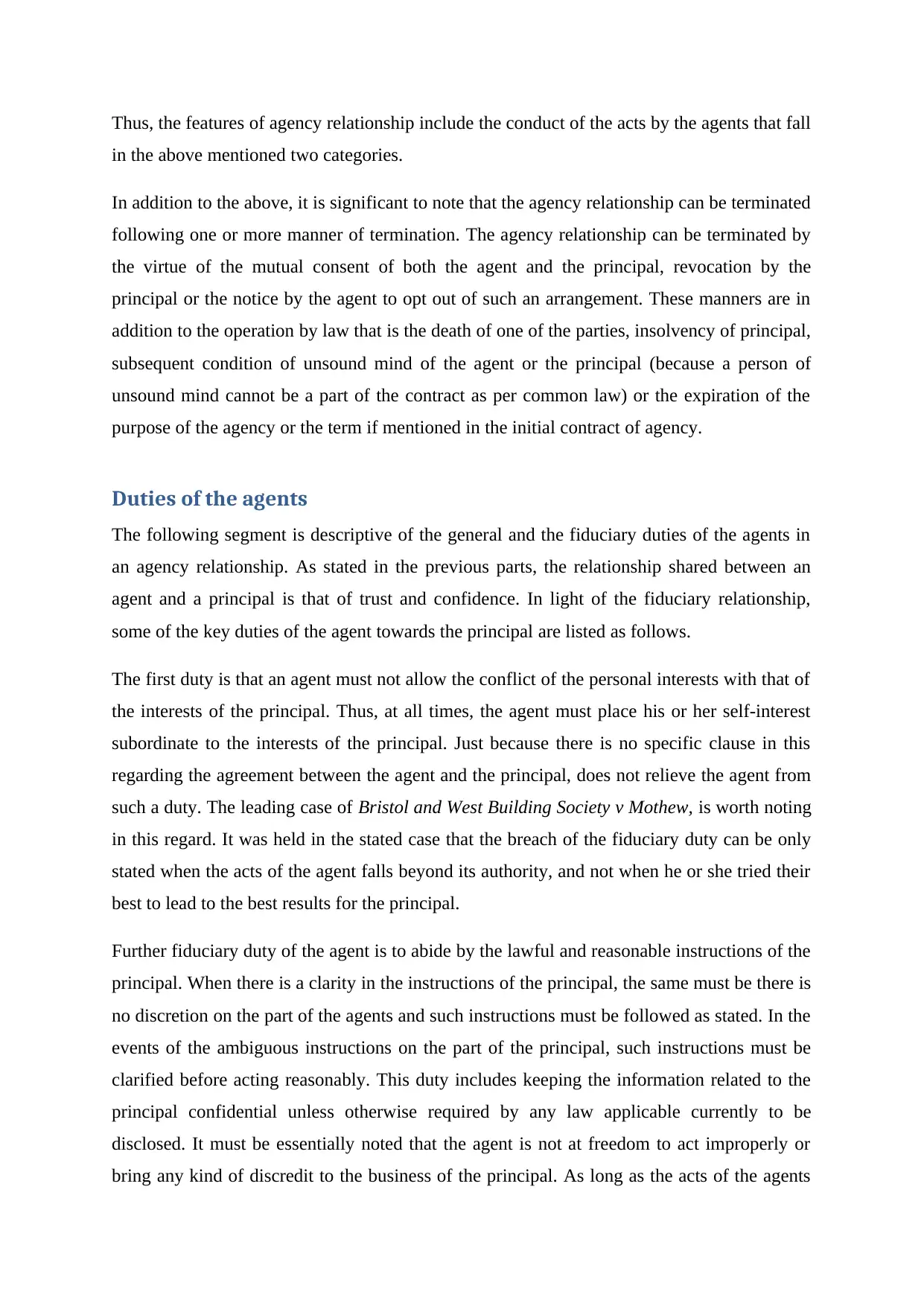
Thus, the features of agency relationship include the conduct of the acts by the agents that fall
in the above mentioned two categories.
In addition to the above, it is significant to note that the agency relationship can be terminated
following one or more manner of termination. The agency relationship can be terminated by
the virtue of the mutual consent of both the agent and the principal, revocation by the
principal or the notice by the agent to opt out of such an arrangement. These manners are in
addition to the operation by law that is the death of one of the parties, insolvency of principal,
subsequent condition of unsound mind of the agent or the principal (because a person of
unsound mind cannot be a part of the contract as per common law) or the expiration of the
purpose of the agency or the term if mentioned in the initial contract of agency.
Duties of the agents
The following segment is descriptive of the general and the fiduciary duties of the agents in
an agency relationship. As stated in the previous parts, the relationship shared between an
agent and a principal is that of trust and confidence. In light of the fiduciary relationship,
some of the key duties of the agent towards the principal are listed as follows.
The first duty is that an agent must not allow the conflict of the personal interests with that of
the interests of the principal. Thus, at all times, the agent must place his or her self-interest
subordinate to the interests of the principal. Just because there is no specific clause in this
regarding the agreement between the agent and the principal, does not relieve the agent from
such a duty. The leading case of Bristol and West Building Society v Mothew, is worth noting
in this regard. It was held in the stated case that the breach of the fiduciary duty can be only
stated when the acts of the agent falls beyond its authority, and not when he or she tried their
best to lead to the best results for the principal.
Further fiduciary duty of the agent is to abide by the lawful and reasonable instructions of the
principal. When there is a clarity in the instructions of the principal, the same must be there is
no discretion on the part of the agents and such instructions must be followed as stated. In the
events of the ambiguous instructions on the part of the principal, such instructions must be
clarified before acting reasonably. This duty includes keeping the information related to the
principal confidential unless otherwise required by any law applicable currently to be
disclosed. It must be essentially noted that the agent is not at freedom to act improperly or
bring any kind of discredit to the business of the principal. As long as the acts of the agents
in the above mentioned two categories.
In addition to the above, it is significant to note that the agency relationship can be terminated
following one or more manner of termination. The agency relationship can be terminated by
the virtue of the mutual consent of both the agent and the principal, revocation by the
principal or the notice by the agent to opt out of such an arrangement. These manners are in
addition to the operation by law that is the death of one of the parties, insolvency of principal,
subsequent condition of unsound mind of the agent or the principal (because a person of
unsound mind cannot be a part of the contract as per common law) or the expiration of the
purpose of the agency or the term if mentioned in the initial contract of agency.
Duties of the agents
The following segment is descriptive of the general and the fiduciary duties of the agents in
an agency relationship. As stated in the previous parts, the relationship shared between an
agent and a principal is that of trust and confidence. In light of the fiduciary relationship,
some of the key duties of the agent towards the principal are listed as follows.
The first duty is that an agent must not allow the conflict of the personal interests with that of
the interests of the principal. Thus, at all times, the agent must place his or her self-interest
subordinate to the interests of the principal. Just because there is no specific clause in this
regarding the agreement between the agent and the principal, does not relieve the agent from
such a duty. The leading case of Bristol and West Building Society v Mothew, is worth noting
in this regard. It was held in the stated case that the breach of the fiduciary duty can be only
stated when the acts of the agent falls beyond its authority, and not when he or she tried their
best to lead to the best results for the principal.
Further fiduciary duty of the agent is to abide by the lawful and reasonable instructions of the
principal. When there is a clarity in the instructions of the principal, the same must be there is
no discretion on the part of the agents and such instructions must be followed as stated. In the
events of the ambiguous instructions on the part of the principal, such instructions must be
clarified before acting reasonably. This duty includes keeping the information related to the
principal confidential unless otherwise required by any law applicable currently to be
disclosed. It must be essentially noted that the agent is not at freedom to act improperly or
bring any kind of discredit to the business of the principal. As long as the acts of the agents
Paraphrase This Document
Need a fresh take? Get an instant paraphrase of this document with our AI Paraphraser
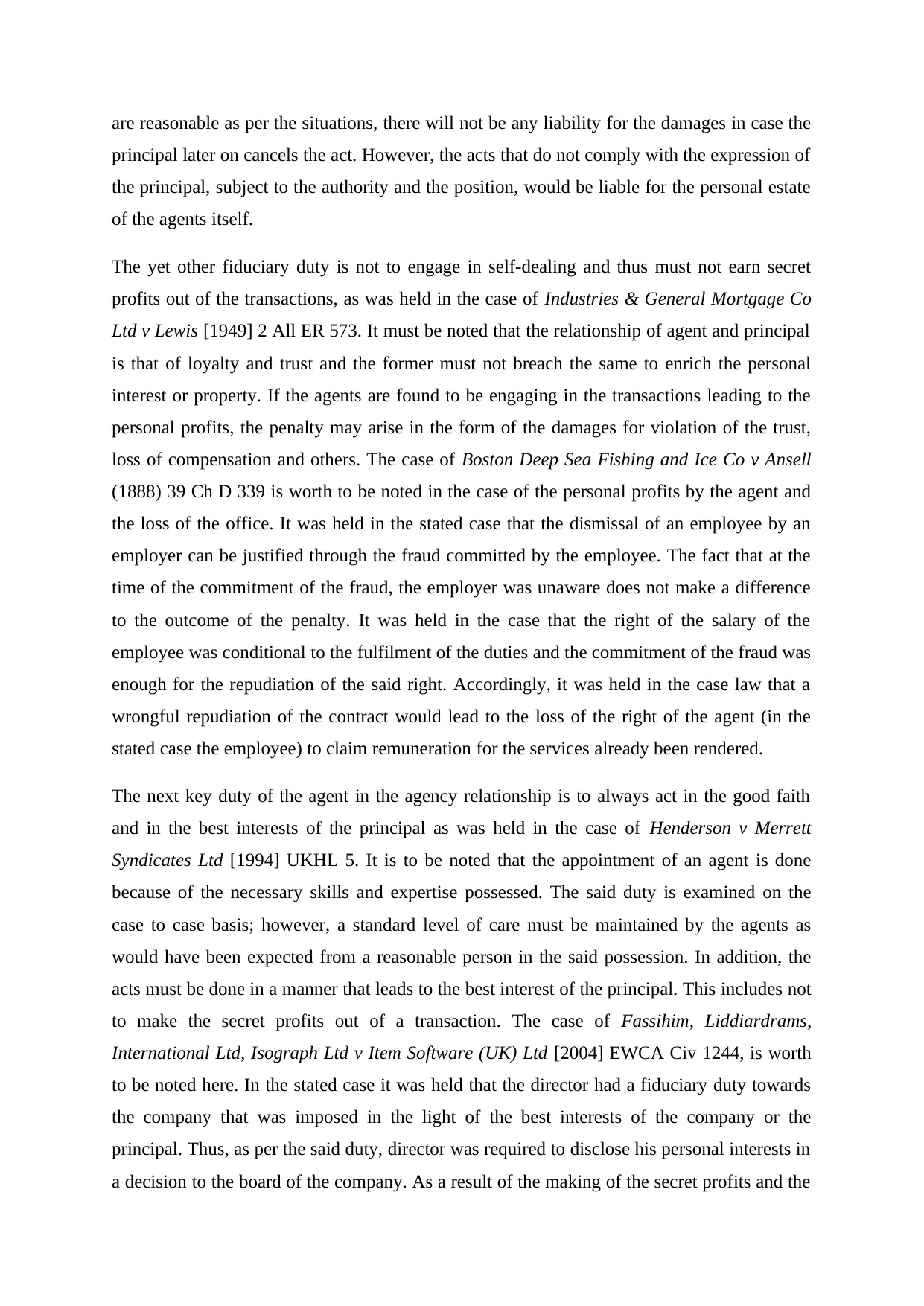
are reasonable as per the situations, there will not be any liability for the damages in case the
principal later on cancels the act. However, the acts that do not comply with the expression of
the principal, subject to the authority and the position, would be liable for the personal estate
of the agents itself.
The yet other fiduciary duty is not to engage in self-dealing and thus must not earn secret
profits out of the transactions, as was held in the case of Industries & General Mortgage Co
Ltd v Lewis [1949] 2 All ER 573. It must be noted that the relationship of agent and principal
is that of loyalty and trust and the former must not breach the same to enrich the personal
interest or property. If the agents are found to be engaging in the transactions leading to the
personal profits, the penalty may arise in the form of the damages for violation of the trust,
loss of compensation and others. The case of Boston Deep Sea Fishing and Ice Co v Ansell
(1888) 39 Ch D 339 is worth to be noted in the case of the personal profits by the agent and
the loss of the office. It was held in the stated case that the dismissal of an employee by an
employer can be justified through the fraud committed by the employee. The fact that at the
time of the commitment of the fraud, the employer was unaware does not make a difference
to the outcome of the penalty. It was held in the case that the right of the salary of the
employee was conditional to the fulfilment of the duties and the commitment of the fraud was
enough for the repudiation of the said right. Accordingly, it was held in the case law that a
wrongful repudiation of the contract would lead to the loss of the right of the agent (in the
stated case the employee) to claim remuneration for the services already been rendered.
The next key duty of the agent in the agency relationship is to always act in the good faith
and in the best interests of the principal as was held in the case of Henderson v Merrett
Syndicates Ltd [1994] UKHL 5. It is to be noted that the appointment of an agent is done
because of the necessary skills and expertise possessed. The said duty is examined on the
case to case basis; however, a standard level of care must be maintained by the agents as
would have been expected from a reasonable person in the said possession. In addition, the
acts must be done in a manner that leads to the best interest of the principal. This includes not
to make the secret profits out of a transaction. The case of Fassihim, Liddiardrams,
International Ltd, Isograph Ltd v Item Software (UK) Ltd [2004] EWCA Civ 1244, is worth
to be noted here. In the stated case it was held that the director had a fiduciary duty towards
the company that was imposed in the light of the best interests of the company or the
principal. Thus, as per the said duty, director was required to disclose his personal interests in
a decision to the board of the company. As a result of the making of the secret profits and the
principal later on cancels the act. However, the acts that do not comply with the expression of
the principal, subject to the authority and the position, would be liable for the personal estate
of the agents itself.
The yet other fiduciary duty is not to engage in self-dealing and thus must not earn secret
profits out of the transactions, as was held in the case of Industries & General Mortgage Co
Ltd v Lewis [1949] 2 All ER 573. It must be noted that the relationship of agent and principal
is that of loyalty and trust and the former must not breach the same to enrich the personal
interest or property. If the agents are found to be engaging in the transactions leading to the
personal profits, the penalty may arise in the form of the damages for violation of the trust,
loss of compensation and others. The case of Boston Deep Sea Fishing and Ice Co v Ansell
(1888) 39 Ch D 339 is worth to be noted in the case of the personal profits by the agent and
the loss of the office. It was held in the stated case that the dismissal of an employee by an
employer can be justified through the fraud committed by the employee. The fact that at the
time of the commitment of the fraud, the employer was unaware does not make a difference
to the outcome of the penalty. It was held in the case that the right of the salary of the
employee was conditional to the fulfilment of the duties and the commitment of the fraud was
enough for the repudiation of the said right. Accordingly, it was held in the case law that a
wrongful repudiation of the contract would lead to the loss of the right of the agent (in the
stated case the employee) to claim remuneration for the services already been rendered.
The next key duty of the agent in the agency relationship is to always act in the good faith
and in the best interests of the principal as was held in the case of Henderson v Merrett
Syndicates Ltd [1994] UKHL 5. It is to be noted that the appointment of an agent is done
because of the necessary skills and expertise possessed. The said duty is examined on the
case to case basis; however, a standard level of care must be maintained by the agents as
would have been expected from a reasonable person in the said possession. In addition, the
acts must be done in a manner that leads to the best interest of the principal. This includes not
to make the secret profits out of a transaction. The case of Fassihim, Liddiardrams,
International Ltd, Isograph Ltd v Item Software (UK) Ltd [2004] EWCA Civ 1244, is worth
to be noted here. In the stated case it was held that the director had a fiduciary duty towards
the company that was imposed in the light of the best interests of the company or the
principal. Thus, as per the said duty, director was required to disclose his personal interests in
a decision to the board of the company. As a result of the making of the secret profits and the
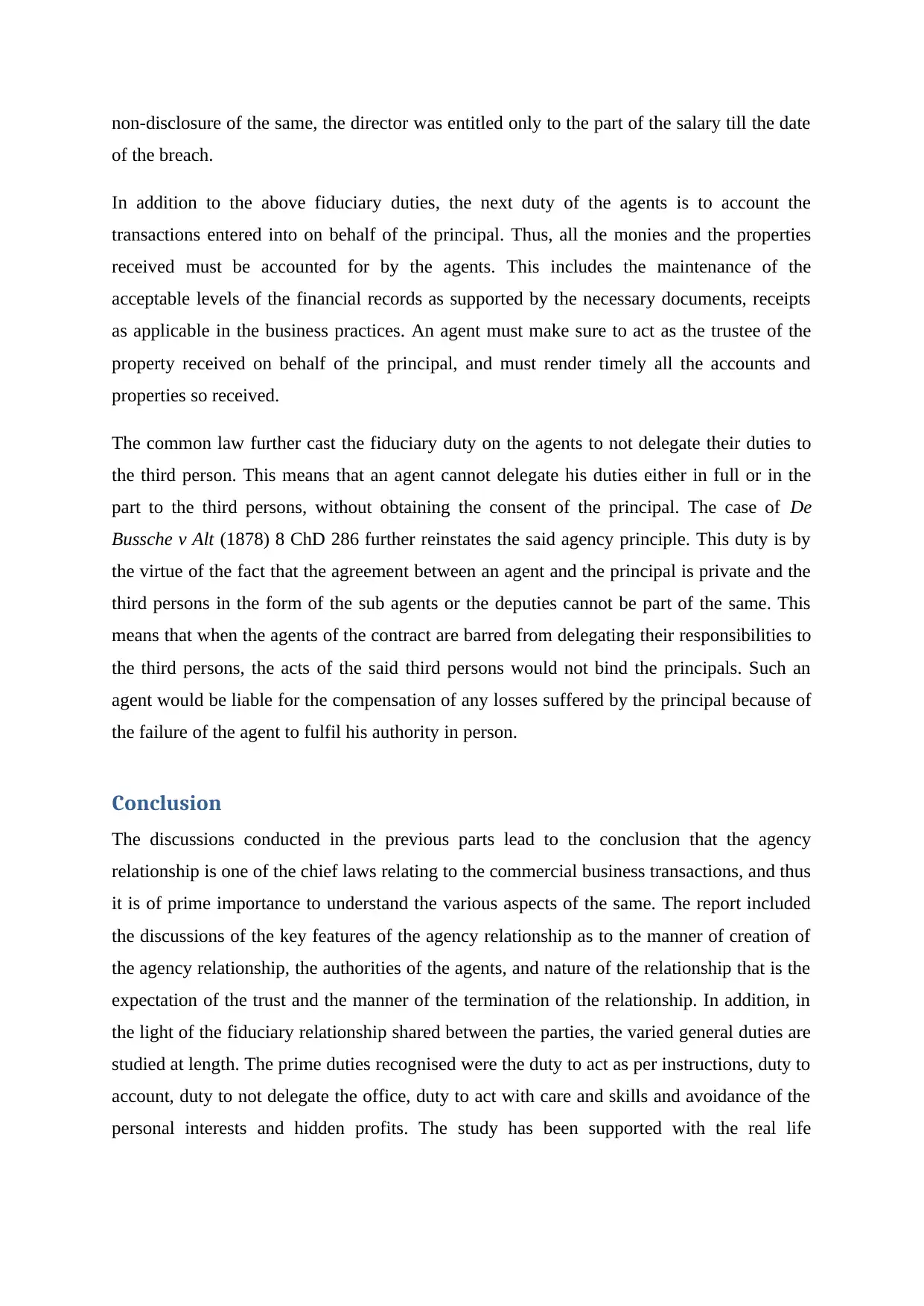
non-disclosure of the same, the director was entitled only to the part of the salary till the date
of the breach.
In addition to the above fiduciary duties, the next duty of the agents is to account the
transactions entered into on behalf of the principal. Thus, all the monies and the properties
received must be accounted for by the agents. This includes the maintenance of the
acceptable levels of the financial records as supported by the necessary documents, receipts
as applicable in the business practices. An agent must make sure to act as the trustee of the
property received on behalf of the principal, and must render timely all the accounts and
properties so received.
The common law further cast the fiduciary duty on the agents to not delegate their duties to
the third person. This means that an agent cannot delegate his duties either in full or in the
part to the third persons, without obtaining the consent of the principal. The case of De
Bussche v Alt (1878) 8 ChD 286 further reinstates the said agency principle. This duty is by
the virtue of the fact that the agreement between an agent and the principal is private and the
third persons in the form of the sub agents or the deputies cannot be part of the same. This
means that when the agents of the contract are barred from delegating their responsibilities to
the third persons, the acts of the said third persons would not bind the principals. Such an
agent would be liable for the compensation of any losses suffered by the principal because of
the failure of the agent to fulfil his authority in person.
Conclusion
The discussions conducted in the previous parts lead to the conclusion that the agency
relationship is one of the chief laws relating to the commercial business transactions, and thus
it is of prime importance to understand the various aspects of the same. The report included
the discussions of the key features of the agency relationship as to the manner of creation of
the agency relationship, the authorities of the agents, and nature of the relationship that is the
expectation of the trust and the manner of the termination of the relationship. In addition, in
the light of the fiduciary relationship shared between the parties, the varied general duties are
studied at length. The prime duties recognised were the duty to act as per instructions, duty to
account, duty to not delegate the office, duty to act with care and skills and avoidance of the
personal interests and hidden profits. The study has been supported with the real life
of the breach.
In addition to the above fiduciary duties, the next duty of the agents is to account the
transactions entered into on behalf of the principal. Thus, all the monies and the properties
received must be accounted for by the agents. This includes the maintenance of the
acceptable levels of the financial records as supported by the necessary documents, receipts
as applicable in the business practices. An agent must make sure to act as the trustee of the
property received on behalf of the principal, and must render timely all the accounts and
properties so received.
The common law further cast the fiduciary duty on the agents to not delegate their duties to
the third person. This means that an agent cannot delegate his duties either in full or in the
part to the third persons, without obtaining the consent of the principal. The case of De
Bussche v Alt (1878) 8 ChD 286 further reinstates the said agency principle. This duty is by
the virtue of the fact that the agreement between an agent and the principal is private and the
third persons in the form of the sub agents or the deputies cannot be part of the same. This
means that when the agents of the contract are barred from delegating their responsibilities to
the third persons, the acts of the said third persons would not bind the principals. Such an
agent would be liable for the compensation of any losses suffered by the principal because of
the failure of the agent to fulfil his authority in person.
Conclusion
The discussions conducted in the previous parts lead to the conclusion that the agency
relationship is one of the chief laws relating to the commercial business transactions, and thus
it is of prime importance to understand the various aspects of the same. The report included
the discussions of the key features of the agency relationship as to the manner of creation of
the agency relationship, the authorities of the agents, and nature of the relationship that is the
expectation of the trust and the manner of the termination of the relationship. In addition, in
the light of the fiduciary relationship shared between the parties, the varied general duties are
studied at length. The prime duties recognised were the duty to act as per instructions, duty to
account, duty to not delegate the office, duty to act with care and skills and avoidance of the
personal interests and hidden profits. The study has been supported with the real life
⊘ This is a preview!⊘
Do you want full access?
Subscribe today to unlock all pages.

Trusted by 1+ million students worldwide

examples in the form of the case laws, to enable the understanding of the consequences on
the breach of the above mentioned fiduciary duties.
the breach of the above mentioned fiduciary duties.
Paraphrase This Document
Need a fresh take? Get an instant paraphrase of this document with our AI Paraphraser
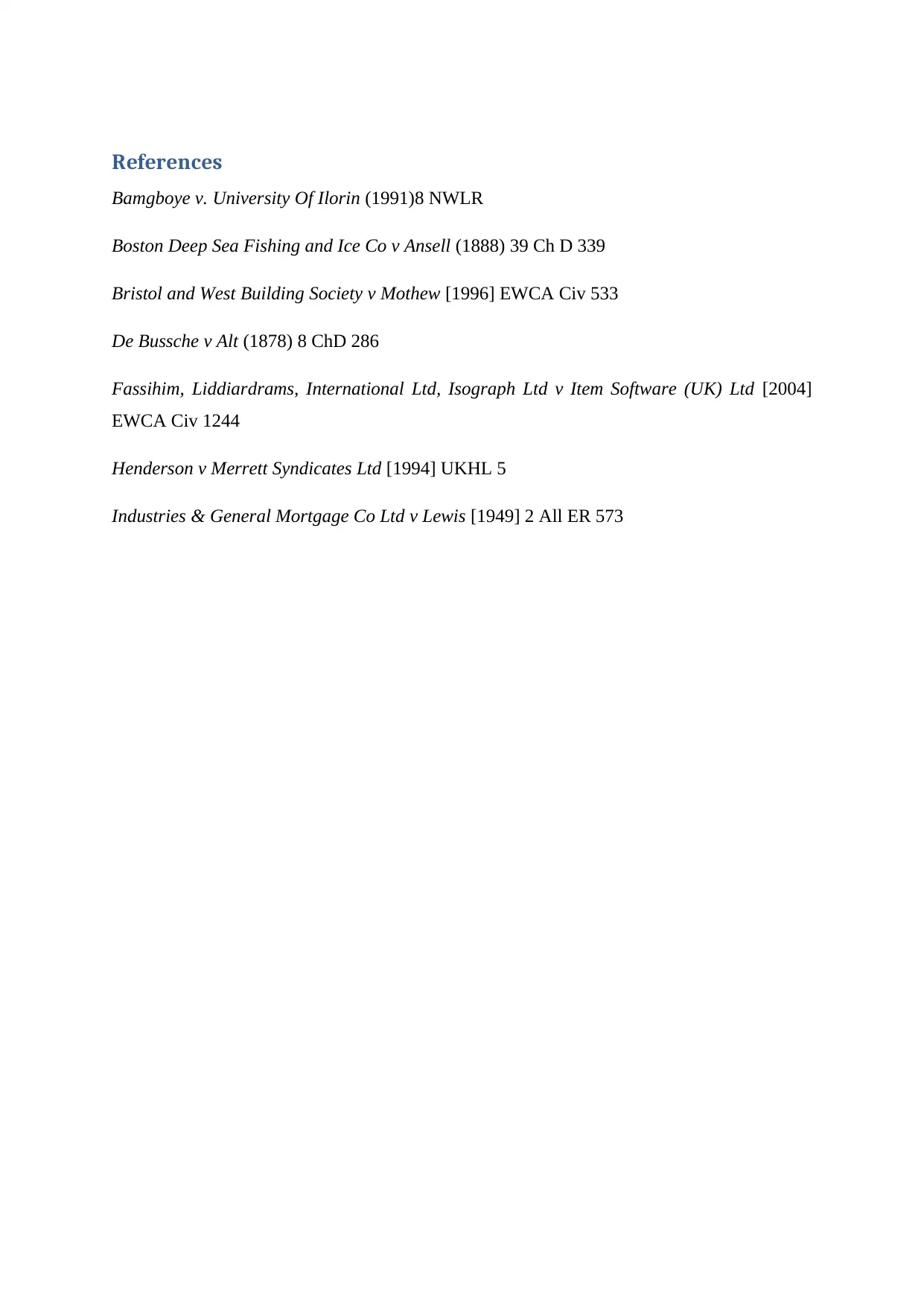
References
Bamgboye v. University Of Ilorin (1991)8 NWLR
Boston Deep Sea Fishing and Ice Co v Ansell (1888) 39 Ch D 339
Bristol and West Building Society v Mothew [1996] EWCA Civ 533
De Bussche v Alt (1878) 8 ChD 286
Fassihim, Liddiardrams, International Ltd, Isograph Ltd v Item Software (UK) Ltd [2004]
EWCA Civ 1244
Henderson v Merrett Syndicates Ltd [1994] UKHL 5
Industries & General Mortgage Co Ltd v Lewis [1949] 2 All ER 573
Bamgboye v. University Of Ilorin (1991)8 NWLR
Boston Deep Sea Fishing and Ice Co v Ansell (1888) 39 Ch D 339
Bristol and West Building Society v Mothew [1996] EWCA Civ 533
De Bussche v Alt (1878) 8 ChD 286
Fassihim, Liddiardrams, International Ltd, Isograph Ltd v Item Software (UK) Ltd [2004]
EWCA Civ 1244
Henderson v Merrett Syndicates Ltd [1994] UKHL 5
Industries & General Mortgage Co Ltd v Lewis [1949] 2 All ER 573
1 out of 8
Related Documents
Your All-in-One AI-Powered Toolkit for Academic Success.
+13062052269
info@desklib.com
Available 24*7 on WhatsApp / Email
![[object Object]](/_next/static/media/star-bottom.7253800d.svg)
Unlock your academic potential
Copyright © 2020–2025 A2Z Services. All Rights Reserved. Developed and managed by ZUCOL.





